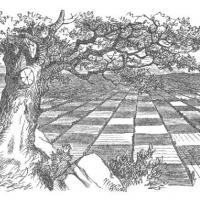
Things to learn from a beginner
My series of articles "Things to learn from a beginner " continue with the idea that you can easily improve your game.
Sometimes in life, just by changing minor things it has a tremendous leverage effect on the results we try to achieve. It is true that no achievement comes without the effort and hard work required for the desired results. What is the easiest things to add 50 or even 100 points to my rating of 1200?
In my golf playing I know that I will never be a Tiger woods or an Ernie Els like my own compatriot from South Africa. They are certainly very talented golf players but their achievements did not come without the greatest of hard work practise and sacrifices. The best investment I made in my Golf playing was not the mega Big Bertha driver I bought but to pay for private lessons with the club Pro. A Few small changes immediately changed my game. A change to my grip, minor change to my swing and immediately the whole action became logical and comfortable and I achieve a consistency in my swing that I would say knock at least 10 strokes of my normal score. I am not a Tiger Woods and the other things I learnt from the Pro still came with the price tag of practise and effort on the driving range.
I am realistic enough about what it would demand to be a 1500 player or a 1700 player than my present estimate of 1250 – 1350 player. A few 10 point tips will certainly not transform you into a higher level chess player. I have identified the two small investments in effort and time that I think would at least add 50 – 100 to my rating. So if you are a 1200 player like me consider the following;
1 Play careful chess by applying a logical thinking process. If I could eliminate all the blunder moves or down right stupid moves from my games then I would probably be able to count an extra 12 wins out of 120 games played. That would be a 10 % improvement on my win loss ratio. My blunder moves is directly the result of the amount of careless moves I make in almost every game. How many moves have I made just because I could check the King or it look like the right place for a piece to be or I see a threatening move and immediately makes it. What about seeing that combination checkmate but knowing it is not possible and easily countered but trying anyway. Many times I hit the “Submit button” and in my minds eye see the poor Knight I put en prise in front of a hungry Bishop. To late, there is no “Take back” button. Certainly carefulness is one of the biggest traits a chess player can have.I certainly don’t know yet what a logical or good thinking process are or should be. It would be enlightening to know how the masters thought processes work.
Short of proposing an algorithm to apply every move at least I am going to ask myself, .whether I have any possible series of moves that can lead to a mate?, Am I under threat? Why did my opponent made that move? What would his next move be? If I don’t make another move what would his move be? When I have seen my move, look for a better move.
2 Review my lost games. I have read the basic principals in many articles and books. I am also aware that it always apply to the situation at hand, but while I am not a Grand master yet why be reckless and bring out the Queen second move into the game? The oldest or most basic one ” Don’t move a piece twice in the opening unless you can take a piece or it is under threat.”
Why when I review my games I see that I don’t apply this knowledge? “Mistakes” For me it is mistakes that I making not “I did not know better”
When my wife and myself venture into a small business and had a few knocks. I said that at least we are learning from our mistakes, but after we found ourselves again and again in a cash flow problem. I said we are making mistakes but we are definitely not learning from them. It was only after we carefully analysed the situation and was able to identified the root causes could we learn and avoid the same mistakes been made.
The same with chess. Where did things went wrong? What would I have done differently now? Reviewing your loss games is a simple free chess lesson. You already invest a lot of time and thinking into it so you understand the game well. Simply play through all the moves and see where things went wrong for you . Was it as consequence of not applying the proper principles? Was it a pure blunder? Maybe you were just plainly outplayed by the opponent. Perhaps you can then learn something from him.
I am of the opinion that 50 games played against slightly stronger opponents and carefully reviewed after wards. is worth more for your improvement than 300 hundred games played and won against lesser opponents and forgotten. So isn’t this a small time investment for a great return.





